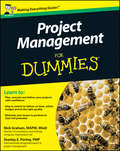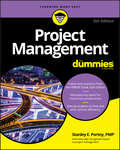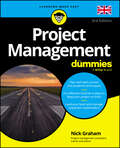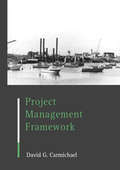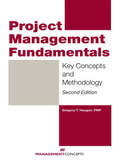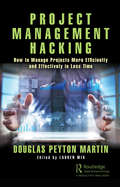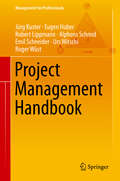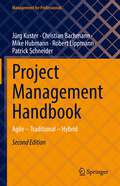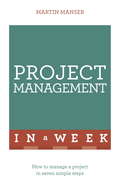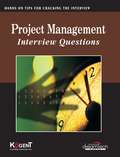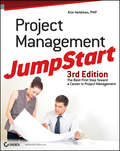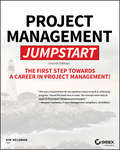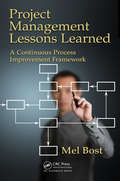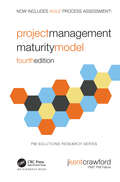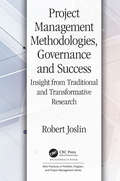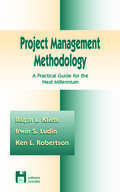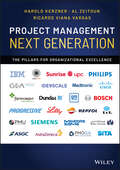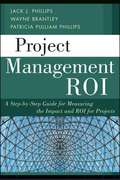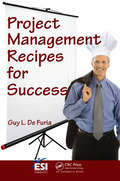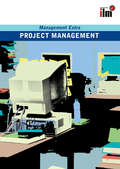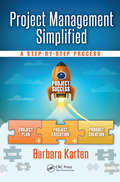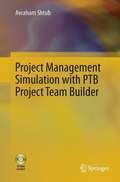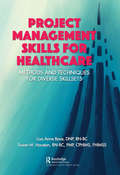- Table View
- List View
Project Management For Dummies
by Stanley E. Portny Nick GrahamIn today's time-pressured, cost-conscious global business environment, tight project deadlines and stringent expectations are the norm. Project Management For Dummies shows business professionals what works and what doesn't by examining the field's best practices. You can learn how to organise, estimate, and schedule projects more efficiently. Discover how to manage deliverables, issue changes, assess risks, maintain communications, and live up to expectations by making the most of the latest technology and software and by avoiding common problems that can trip up even the best project managers.This adaptation includes:The latest methods to manage resources and stay on track and within budgetCoverage for dealing with the pros and cons of virtual teamsTips and information on setting realistic expectations and meeting everyone's needsMethods and strategies to get tasks done with minimal staffTips and advice for motivating a project teamThe latest concepts and fundamentals behind best-practice project management techniquesThe mindset and skill set of today's most effective project managers--what it really takes to guarantee a successful projectInformation on how to involve project audiences by conducting a Stakeholder AnalysisTrends and tough project typesAssessment tools to determine strengths and weaknesses for everything from choosing software to selecting a project teamTactics for team motivation and the hottest risk management strategies
Project Management For Dummies
by Stanley E. PortnyThe bestselling "bible" of project management In today's time-crunched, cost-conscious global business environment, tight project deadlines and stringent expectations are the norm. Now with 25 percent new and updated content, Project Management For Dummies introduces you to the principles of successful project management and shows you how to motivate any team to gain maximum productivity. You'll learn how to organize, estimate, and schedule projects efficiently and effectively. You'll also discover how to manage deliverables, issue changes, assess risks, maintain communications, and live up to expectations by making the most of the latest technology and software--and by avoiding common problems that can trip up even the best project managers. The latest information on measuring project management ROI and value to the organization (and customers) Managing Continuous Process Improvement Examples of formats used for different aspects of project management Managing distressed projects and managing multiple team projects Hierarchical decomposition and how it can dramatically improve the effectiveness of project planning and control The latest trend of embracing the use of social media to drive efficiency and improve socialization New information on managing and resolving conflicts that occur during a project Explanations of concepts tested in the PMP#65533; certification exam with study tips and practices to help you pass Project Management For Dummies gives professionals like you everything you need to be successful project managers. (PMI, CAPM, PMP, and Project Management Professional are registered marks of the Project Management Institute, Inc. )
Project Management For Dummies - UK
by Nick GrahamStay on track and within budget with this accessible guide to project planning Project Management For Dummies guides you to a thorough understanding of how to successfully manage projects—and the people who work on them—even if you’re brand new to the project management field. You’ll learn the basic concepts, key tips and tricks for making things go smoothly, and updated information relevant to today’s UK business practices. Even if you aren’t entering a project management role, you’ll need to learn project planning skills to stay competitive in today’s employment market. Now revised with fresh content on everything from a project’s start to its finish, this friendly Dummies title will teach you to manage projects large and small. Learn the must-know concepts in project management Discover planning techniques that will enhance your effectiveness Manage projects with in-person or virtual teams Avoid common mistakes and know what to do when the unexpected happensThis guide is excellent for anyone in a project management role, students with an eye toward a career in project management, and anyone who needs to organize and complete large tasks.
Project Management Framework
by D.G. CarmichaelThis book covers the framework of project management, a discipline that is topical in many quarters. The aims of ‘Project Management Framework’ are to understand project management and to stimulate and contribute to a structured way of thinking in applying this discipline. In this work, a systems view to project management is described, based on the realization that management is a synthesis or inverse problem. One of the overriding reasons for writing this book was to counter the myriad of misconceptions and thinking errors that exist amount project management writers and practitioners. In addition, the usage of correct terminology and application of right level of thinking are discussed as factors contributing to the heart of more mature management practices. The subject matter is developed in this edition through looking at the fundamentals of projects and management and subsequently through studying the chronological development of the project life cycle. In order to support theory, numerous case examples from diverse industries are included. Aspects that are generally not available elsewhere are highlighted, whereas project management material that is readily available in other texts has been deliberately omitted. This book is intended to serve students, teachers and practitioners. As only very few prerequisites are needed apart from a basic interest in projects, some exposure to the discipline and a systematic thinking ability, this book serves a broad group of interested readers who want to know more about the discipline.
Project Management Fundamentals: Key Concepts and Methodology
by Gregory T. Haugan PhD, PMPBuild on the Right Fundamentals for Project Management Success!To achieve success in any endeavor, you need to understand the fundamental aspects of that endeavor. To achieve success in project management, you should start with Project Management Fundamentals: Key Concepts and Methodology, Second Edition.This completely revised edition offers new project managers a solid foundation in the basics of the discipline. Using a step-by-step approach and conventional project management (PM) terminology, Project Management Fundamentals is a commonsense guide that focuses on how essential PM methods, tools, and techniques can be put into practice immediately.New material in this second edition includes:• A thorough discussion of agile project management and its use in real-life situations• Detailed explanations of the unique factors involved in managing service projects• An enhanced appendix on management maturity models• A new appendix on project communications and social networking• Expanded coverage of the triple constraints in PM, going beyond scope, schedule, and cost to include quality, resources, and risksAs a refresher for the experienced project manager or as a comprehensive introductory guide for the new practitioner, Project Management Fundamentals: Key Concepts and Methodology, Second Edition, is the go-to resource that delivers.
Project Management Hacking: How to Manage Projects More Efficiently and Effectively in Less Time
by Douglas Peyton MartinThis book provides the much-needed, no-nonsense guidance crucial for project managers – that is, the type of guidance that is missing from every major body of knowledge and educational offering for working project managers. This very practical book identifies the activities that influence project success and focuses the limited time and energy available towards just those activities. The Project Management Institute (PMI) and most literature on project management discusses all aspects of project management under the assumption that project managers will narrow down focus because they cannot be expected to use every process outlined by PMI to manage every project. This book uses the concept of "hacking" our standard conventions of project management and outlines a standard path identified by conventional wisdom, an evil path that project managers frequently resort to under time/quality pressures, and a hacker path that provides a better way to look at the challenge. This book equips project managers with streamlined approaches to refocus their efforts on factors that matter while spending less time doing it. Project management is a demanding discipline with a growing body of knowledge with few instructions on how to do it all. The author provides humorous anecdotes and examples while teaching readers how to save time, improve quality, and advance their career. The primary sections of the book cover how to approach the most common certifications in project management; continuing education; leading project teams; initiating, planning, executing, monitoring, and controlling projects; general life skills; and taking on additional responsibilities. Hacking project management is about focusing the limited bandwidth a project manager can give a project towards the activities that drive success.
Project Management Handbook
by Jürg Kuster Eugen Huber Robert Lippmann Alphons Schmid Emil Schneider Urs Witschi Roger WüstThis practical handbook offers a comprehensive guide to efficient project management. It pursues a broad, well-structured approach, suitable for most projects, and allows newcomers, experienced project managers and decision-makers to find valuable input that matches their specific needs. The Project Management Compass guides readers through various sections of the book; templates and checklists offer additional support. The handbook's innovative structure combines concepts from systems engineering, management psychology, and process dynamics. This international edition will allow to share the authors' experience gained in many years of project work and over 2,000 project management and leadership seminars conducted for BWI Management Education in Zurich, Switzerland. This is an excellent handbook for practical project management in today's world. Prof. Dr. Heinz Schelle, Honorary Chairman of the GPM (German Project Management Association)The authors' many years in practical experience in setting up, implementing and managing projects shines through in this book. The book also reflects the current trend towards increased social competence. I am therefore pleased to recommend this book as a basis for certification in project management. Dr. Hans Knöpfel, Honorary President of the SPM (Swiss Project Management Association)
Project Management Handbook: Agile – Traditional – Hybrid (Management for Professionals)
by Christian Bachmann Jürg Kuster Robert Lippmann Patrick Schneider Mike HubmannThis practical handbook offers a comprehensive guide to efficient project management. It pursues a broad, well-structured approach, suitable for most projects, and allows newcomers, experienced project managers, and decision-makers to find valuable input that matches their specific needs. The Project Management Compass guides readers through various sections of the book; templates and checklists offer additional support. The handbook’s innovative structure combines concepts from systems engineering, management psychology, and process dynamics. This international edition will allow to share the authors' experience gained in many years of project work and over thousands of project management and leadership seminars conducted for BWI Management Education in Zurich, Switzerland. This second, entirely revised edition of the Project Management Handbook is based on the fundamentals of the previous standard work and is aligned with the German 5th edition. It now covers a large number of new or updated topics. This work has also been updated to help with the IPMA certification and offers a comprehensive reference table for all competence elements of the Individual Competence Baseline of IPMA® (ICB4).
Project Management In A Week: How To Manage A Project In Seven Simple Steps
by Martin ManserManaging projects just got easierThis book will help you come to grips with the basics of project management in a week. By the end of the week you will know your way through the process more clearly. For a start, you will have to consult your end users to work out their precise requirements. You will then need to work out the best way to deliver the required outputs, consider the size of the team you will need to meet those requirements and prepare a schedule for the project. Most importantly, you will need to firm up costs, work out a budget and develop monitoring procedures to keep to the agreed costs. You will learn tips for communicating well, especially when dealing with unexpected problems that may arise.Each day of the week covers a different area and the material is structured for ease of reference. An introduction gives you a 'heads-up' as to what the day is about. The main material then explains the key lessons to be learned. Important principles are clarified and backed up by case studies, quotations and tables. Each day concludes with a summary, next steps and multiple-choice questions, to reinforce the learning points.Sunday: Think clearly. Lay firm foundations for your project as you clarify and set parameters for the project.Monday: Plan your project carefully. Begin to make detailed arrangements for the various stages of the project.Tuesday: Cost your project wisely in the planning stage and ensure that you have rigorous controls in place to monitor costs and quality as you implement the project.Wednesday: Implement your project successfully. After all your planning and preparation, you are now ready to put the project into practice.Thursday: Communicate effectively. Good communication with all the colleagues involved in your project is vital to ensure that the team works successfully.Friday: Deal with change constructively. Here we look at why some projects go off track and how to manage changes.Saturday: Conclude and evaluate your project positively. How do you complete all the final stages of your project? What lessons can you learn as you evaluate the success of your project?
Project Management In A Week: How To Manage A Project In Seven Simple Steps
by Martin ManserManaging projects just got easierThis book will help you come to grips with the basics of project management in a week. By the end of the week you will know your way through the process more clearly. For a start, you will have to consult your end users to work out their precise requirements. You will then need to work out the best way to deliver the required outputs, consider the size of the team you will need to meet those requirements and prepare a schedule for the project. Most importantly, you will need to firm up costs, work out a budget and develop monitoring procedures to keep to the agreed costs. You will learn tips for communicating well, especially when dealing with unexpected problems that may arise.Each day of the week covers a different area and the material is structured for ease of reference. An introduction gives you a 'heads-up' as to what the day is about. The main material then explains the key lessons to be learned. Important principles are clarified and backed up by case studies, quotations and tables. Each day concludes with a summary, next steps and multiple-choice questions, to reinforce the learning points.Sunday: Think clearly. Lay firm foundations for your project as you clarify and set parameters for the project.Monday: Plan your project carefully. Begin to make detailed arrangements for the various stages of the project.Tuesday: Cost your project wisely in the planning stage and ensure that you have rigorous controls in place to monitor costs and quality as you implement the project.Wednesday: Implement your project successfully. After all your planning and preparation, you are now ready to put the project into practice.Thursday: Communicate effectively. Good communication with all the colleagues involved in your project is vital to ensure that the team works successfully.Friday: Deal with change constructively. Here we look at why some projects go off track and how to manage changes.Saturday: Conclude and evaluate your project positively. How do you complete all the final stages of your project? What lessons can you learn as you evaluate the success of your project?
Project Management Interview Questions
by Kogent Learning Solutions IncProject Management Interview Questions
Project Management JumpStart
by Kim HeldmanPrepare for a Project Management Career--Fast!Project Management JumpStart gives you the solid grounding you need to approach a career in project management with confidence:Understanding the skills of a successful project managerCreating project schedules and budgetsWinning the support of department managersMonitoring project progress and taking corrective actionCommunicating and negotiating effectivelyMotivating the people on whom the project dependsDocumenting the project clearly and professionally
Project Management JumpStart
by Kim HeldmanAn informative introduction for those considering a career in project management Project Management JumpStart offers a clear, practical introduction to the complex world of project management, with an entertaining approach based on real-world application. Fully revised to align with a Guide to the Project Management Body of Knowledge –PMBOK Guide©, 6th edition, this book provides an overview of the field followed by an exploration of current best practices. The practical focus facilitates retention by directly linking critical concepts to your everyday work, while the close adherence to PMBOK guidelines makes this book the perfect starting point for those considering certification to earn either PMP or CompTIA Project+ credentials. Project management is a top-five, in-demand skill in today’s workplace, and the demand has spread far beyond IT to encompass nearly every industry; any organization that produces goods or services, whether for profit or not, has a vested interest in ensuring that projects are completed on time, on budget, and to the satisfaction of the client—this is the heart of the project management function. Let Kim Heldman, bestselling author of PMP Study Guide and CompTIA Project+ Study Guide, walk you through the basic principles and practices to help you build a strong foundation for further training. Understand current project management methods and practices Explore project management from a practical perspective Delve into illustrative examples that clarify complex issues Test your understanding with challenging study questions Trillions of dollars are invested in various projects around the world each year, and companies have learned that investing in qualified project management professionals pays off in every aspect of the operation. If you’re considering a career in project management, Project Management JumpStart provides an excellent introduction to the field and clear direction for your next steps.
Project Management Lessons Learned: A Continuous Process Improvement Framework
by Mel BostProject Management Lessons Learned: A Continuous Process Improvement Framework is intended for project managers, PMO professionals, and students of project management who wish to apply performance-based feedback to their process and project improvements. This feedback is the basis for modern process control theory, which is playing a greater and greater role in process design. Readers can apply the Process Feedback Framework, as well as lesson learned from the book’s case studies, to meet challenges that arise now and in the future. <P><P>Special focus is given to technology development in projects and sustainability implications of process design. The book emphasizes rationale for a robust project risk management program which capitalizes on lessons learned. PMO leaders can use the organizational dynamics and systems archetypes applications presented in the book to define project policy standards and procedures to align PMO behaviors with performance objectives. <P><P>Project Management Lessons Learned: A Continuous Process Improvement Framework is intended for project managers, PMO professionals, and students of project management who wish to apply performance-based feedback to their process and project improvements. This feedback is the basis for modern process control theory, which is playing a greater and greater role in process design. Readers can apply the Process Feedback Framework, as well as lesson learned from the book’s case studies, to meet challenges that arise now and in the future. Special focus is given to technology development in projects and sustainability implications of process design. The book emphasizes rationale for a robust project risk management program which capitalizes on lessons learned. PMO leaders can use the organizational dynamics and systems archetypes applications presented in the book to define project policy standards and procedures to align PMO behaviors with performance objectives.
Project Management Manual
by H. Kent BowenA descriptive manual for how to manage the process of project management. Major sections are: 1) define and organize the project, 2) plan the project, and 3) track and manage the project. 12 processes are described in detail.
Project Management Maturity Model (PM Solutions Research)
by J. Kent CrawfordAssisting organizations in improving their project management processes, the Project Management Maturity Model defines the industry standard for measuring project management maturity and agile and adaptive capabilities. Project Management Maturity Model, Fourth Edition provides a roadmap showing organizations how to move to higher levels of organizational behavior, improving project success and organizational performance. It's a comprehensive tool for enhancing project management practices, covering areas critical to organizational improvement, such as the project management office, management oversight, and professional development. It also provides methods for optimizing project management processes and suggestions for deploying the model as a strategic tool in improving business outcomes. New material in each chapter also outlines good practices for implementing adaptive an agile processes. The book also includes the Project Portfolio Management Maturity Model, which covers best practices for determining portfolio maturity, setting short-term priorities, implementing benefits realization management, improving portfolio management processes and tracking progress. The author, J. Kent Crawford, CEO of PM Solutions, describes the basics of project management maturity, including the benefits of assessing maturity, and presents a comprehensive framework for improving organization's processes. Chapters are based on the ten project management knowledge areas specified in the Project Management Institute's standard, the PMBOK® Guide. This edition provides new and revised materials based on the PMBOK® Guide including a fresh focus on agile and adaptive methods, benefits realization, and organizational change management. This book's fourth edition features: Determine the maturity of your organization's project management processes Gauge readiness for agile transformation Map out a logical path to improve your organization's processes Set priorities for short-term process improvement action Track and visualize improvements in project management over time Learn to translate process maturity into business results After an objective assessment, an organization can set its goals for increasing the capability of its processes and develop a plan for reaching those goals. This book is ideal for anyone involved with improving the capability of an organization's project and portfolio management processes.
Project Management Methodologies, Governance and Success: Insight from Traditional and Transformative Research (Best Practices and Advances in Program Management)
by Robert JoslinProject management methodologies, practices, and guidelines are the only explicit information that project managers have and, when properly maintained, should reflect the most current knowledge and guidance to achieve repeatable successful project outcomes. Despite more than 50 years of research in the field of project management, project success r
Project Management Methodology: A Practical Guide for the Next Millenium
by Ralph L. Kliem Irwin S. Ludin Ken L. RobertsonThis work introduces Practical Project Management Methodology (P2M2), an international joint venture developed by three experienced project managers the provide useful steps applicable throughout the life cycle of a variety of projects. It covers areas from leading, defining and planning to organizing, controlling and closing. The two disks include
Project Management Next Generation: The Pillars for Organizational Excellence
by Harold Kerzner Al Zeitoun Ricardo Viana VargasPROJECT MANAGEMENT NEXT GENERATION Strategic guidance on enabling transformational change in the project management landscape In Project Management Next Generation: The Pillars for Organizational Excellence, a team of world-renowned project management leaders delivers an expert discussion on project management implementation in organizations of all kinds. The book explores 10 pillars of project management that will be critical for companies in the coming decade. It offers contributions from industry changemakers and thought leaders that provide the perfect balance between practical experience across a variety of programs, projects, and transformation initiatives. It’s a must-have title for practicing project managers who seek hands-on guidance and insightful case studies complete with discussion questions and instruction materials, including PowerPoint lecture slides and a full Instructors Manual on the companion website. In addition to the perspectives of several global commercial organizations on the project management industry’s future, readers will find: Thorough introductions to project management as a strategic competency and corporate project management cultures Comprehensive explorations of workforce upskilling and defining project success Practical discussions of flexible project management frameworks and flexible life cycle phases and project governance In-depth examinations of value-driven project management and metrics, as well as metrics for intangible assets, and strategic metrics Perfect for mid-level corporate, project, and team managers, as well as executives and business consultants, Project Management Next Generation: The Pillars for Organizational Excellence will also earn a place in the libraries of students in courses on advanced project management at the upper-level undergraduate and graduate levels.
Project Management ROI
by Jack J. Phillips Wayne Brantley Patricia P. PhillipsBusiness & Economics/Project ManagementAn exclusive portal to the methods and tools the ROI Institute uses to determine return on investment in project managementTo survive this modern age of financially skeptical "show me the ROI" investors, it is a crucial step for companies to develop an effective project management strategy in order to stay ahead of the curve and achieve success. Project Management ROI takes the guesswork out of determining how to monetarily value projects by teaching the time-tested Return on Investment (ROI) methodology. It presents these results-based concepts in a methodical, reproducible manner that project managers, executives, and analysts can use as a validated reference for future projects. This book focuses on an array of measures to forecast project value and collect data during and after implementation, including reaction, learning, application and implementation, impact, return on investment, and intangibles. Project Management ROI:Is the first book from the renowned ROI Institute to focus on project management ROIProvides both the tools and methodology for measuring the ROI of project management investmentsWill help project managers discover the value of specific project management solutions to justify project expenditures
Project Management Recipes for Success (ESI International Project Management Series)
by Guy L. De FuriaGrounded in practicality, this book explains the procedures for running a successful project and highlights the finer points of managing and controlling the project. Written specifically for those responsible for the hands-on managing of projects, it is also useful to program managers and senior executives. Project managers will gain the confidence that comes from following a good recipe for success. Program managers will gain a perspective on the myriad of activities their project managers must perform to achieve a well-disciplined project.
Project Management Revised Edition: Revised Edition (Management Extra Ser.)
by ElearnManagement Extra brings all the best management thinking together in one package. The series fuses key ideas with applied activities to help managers examine and improve how they work in practice. Management Extra is an exciting, new approach to management development. The books provide the basis for self-paced learning at level 4/5. The flexible learning structure allows busy participants to study at their own convenience, minimising time away from the job. The programme allows trainers to quickly plan and deliver high quality, business-led courses. Trainers can select materials to meet the needs of their delegates, clients, and budget. Each book is divided into themes of ideal length for delivering in a training session. Each theme has a range of activities for delegates to complete, putting the training into context and relating it to their own situation and business. The books’ lively style will stimulate further interest in the subjects covered. Guides for further reading and valuable web references provide a lead-in to further research. Management Extra is based on the NVQ framework to ease the creation of Diploma, Post Graduate Diploma or NVQ programmes for managers. It is accredited with all leading awarding bodies.
Project Management Simplified: A Step-by-Step Process (Systems Innovation Book Ser.)
by Barbara KartenAre projects a problem for you? Do your projects cost too much, take too long, or are just not quite right? If so, Project Management Simplified: A Step-by-Step Process is the book for you. It applies well-defined processes for managing projects to managing change in our lives. It describes an approach modeled on a process used successfully in busi
Project Management Simulation with PTB Project Team Builder
by Avraham Shtub"The Project Team Builder (PTB) meets the need for an effective teaching and training tool of project management. The software introduces the user to the full dynamics of project planning, monitoring and control, moving scenario-wise from the easy, fundamental issues to the more involved, complex ones. Based on a sound conceptual foundation, it provides the ideal individual and team training support for bringing projects to completion effectively and efficiently in a dynamic stochastic environment. Highly recommended" Willy Herroelen, Emeritus Professor of Operations Management, Katholieke Universiteit Leuven "The Engineering Project Management School of the Israeli Electric Company (IEC) used the Project Team Builder simulator developed at the Technion. Using PTB, it was possible to practice risk management when uncertainty is presented in resources availability, duration of activities and cash flow. The challenges presented to the students increased motivation. The quality of the learning process, as well as the end results, was excellent." Sergio Klik, Director, Engineering Project Management School, The Israeli Electric Company "PTB takes an important step in the right direction. It employs simulation in order to put the student in the real situation where he has to plan and execute projects by handling all issues at once. In particular, it puts the student in a situation where his project is exposed to risk. By this, the student has to combine the isolated and simplified views on projects, and he learns that risk can materialize and that he has to plan and execute the project accordingly. This is a very important aspect of project management which is learnt by doing (and failing) and which has not been delivered this way before." Rainer Kolisch, Professor of Operations Management, TUM School of Management, Technische Universität München A video tutorial of the Project Team Builder (PTB) simulator is available at the following link: http://www.sandboxmodel.com/videos-1 The tutorial presents the PTB version that comes with the book and demonstrates the use of PTB for training and for teaching.
Project Management Skills for Healthcare: Methods and Techniques for Diverse Skillsets
by Susan M. Houston Lisa Anne BoveProject management skills are valuable for any healthcare project, not just technology projects. Non-technology activities that would benefit from project management skills include implementing a new policy housewide, updating training for use of the electronic health record (EHR), creating a new orientation program, quality assurance activities, submitting an article or presentation, writing a research proposal, or opening a new patient care unit. In addition, project management skills are not just for project managers, but they can be used by anyone leading these types of activities, such as managers, staff, educators, and researchers. Many books on healthcare project management have been focused on technology projects while non-technology projects flounder without the required knowledge or skills of the person leading the project. The purpose of this book is to discuss these skills based on the Project Management Institute (PMI) standards in a way that non-project managers would be able to understand and apply. Concepts from project initiation through project closure will be presented twice, first for novices and then for project leaders with more advanced skills. Practical, accessible, and containing numerous examples for each phase of the PMI Framework, this book will be a valuable resource for all healthcare professionals and both novice and experienced project managers.
